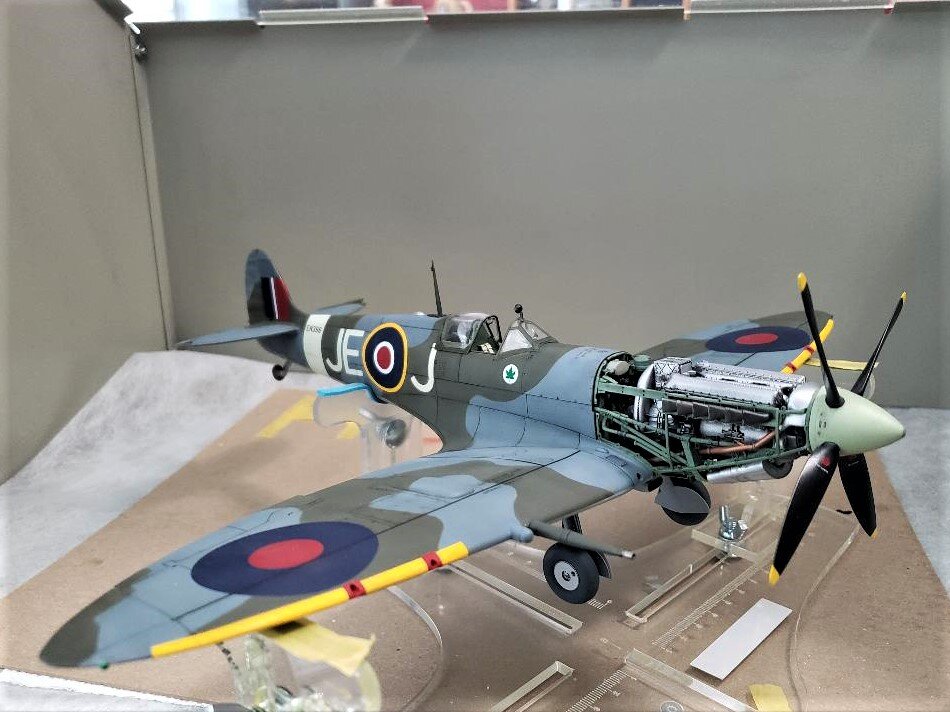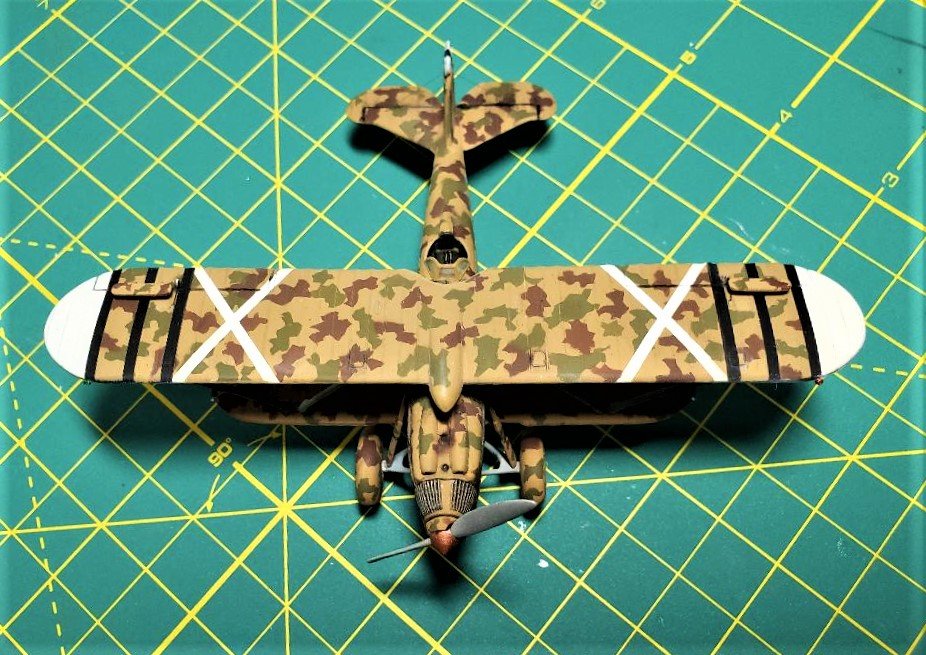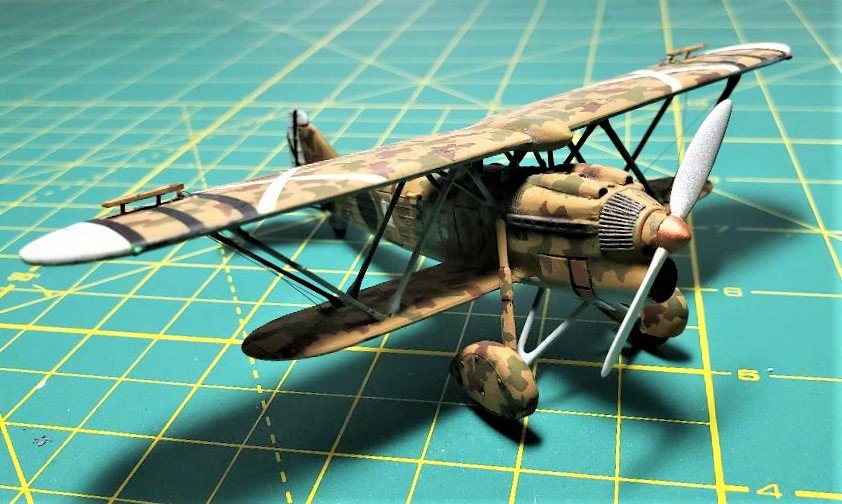-
Posts
20 -
Joined
-
Last visited
-
Days Won
4
Content Type
Profiles
Forums
Events
Everything posted by jlent
-
Thank you very much, Ken. Your comment is much appreciated. I had a fun time building this kit.
-
Jean-Marc - Appreciate your comments. Thank you. I was very happy with how the kit came together.
-
Kevin - Thank you for reaching out. Despite the length of time taken to complete the kit, I enjoyed the build. Appreciate your support!
-
Gil - Thank you for your thoughts. They are very much appreciated. I bought one of those Bill's Bases with a cover to protect the model. I saw them when I attended Nationals last year.
-
My modeling interests focus on 1/72 scale aircraft, but my daughter inspired me to try something outside my “comfort zone.” Like a number of young Americans, she faced a difficult time during the COVID pandemic. During that time, she lost her job. Despite this set back, she didn’t give up, and within a few months of searching, she found a career path that continues to the present day. I wanted to do something for her to celebrate her determination and perserverence. As a modeler, I thought…build her something. As I thought about it, the idea of building a 1/72 scale model wasn’t going to cut it. I mean, if I was going to build her something, I needed to show detail. I wanted to build her a fighter, because in facing all that adversity, she was a indeed a fighter. I decided to build a Supermarine Spitfire, because it was not only a first-rate fighter plane, but one of the most aesthetically beautiful aircraft ever built. The Tamiya 1/32 Spitfire Mk IXc certainly fit the bill. It’s well engineered, the instructions are clear, and the kit includes photo-etch parts and canopy masks. I didn’t like the photo-etch seatbelt harness, so I bought a cloth seatbelt harness made by HGWModels. That was a kit all by itself. I also added cabling for the throttle, radio, cockpit lighting, and on the control column that support the guns. I added an oxygen hose on the cockpit side-wall for additional interest. The kit provides three different versions to build including a clipped wing model. I built the model representing the aircraft flown by Wing Commander James Edgar “Johnnie” Johnson, Officer Commanding, Kenley Wing , RAF Fighter Command during the Spring of 1943. The Osprey Aces series stated that Johnson achieved 12 victories and 5 shared victories flying this aircraft. It took a while to complete this model, but it was worth it. To those attending the upcoming Nationals in San Marcos, safe travels and enjoy! We now return you to our regularly scheduled 1/72 scale model aircraft programming.
-
Hey Gil - Wanted to congratulate you on a great job with the P-3C Orion--well done, indeed! My brother was a photo mate assigned to VP-5, "Mad Foxes," out of JAX--very impressive unit. I have the Hasegawa kit in my stash with the decals for his squadron. Look forward to the build.
-
I think you did a great job with your model--the natural metal finish is very well done. I also learned something new from your post. I knew Northrop built propeller-driven and jet-powered flying wing bomber prototypes, but I didn't know they worked on a nuclear-powered version. I read the Air Force experimented with nuclear-powered aircraft, but the only one I ever heard of was a modified version of a B-36 bomber. It had a leaded compartment to house the reactor, which also added significantly to the weight of the airplane--not a practical idea; not to mention the problems they would face in the event one of these aircraft crashed in the U.S. Thank you for sharing!
-
Gil - Outstanding work on your Fury. The natural metal finish is superb. To me, the best feature is the folding wings; I'm so used to looking at USAF Sabre airframes, that the folding wings offer a unique look. The other thing I noticed is that the Fury's wings seem wider chord-wise than the Air Force version. You had some panels under the fuselage, aft of the airbrakes; assume that is where the arrestor hook was stored? My high school physics teacher, Col Jeff DeBlanc was a Marine aviator, and he flew one of these jets. During World War II, he flew Wildcats as part of the Cactus Air Force and received the Medal of Honor for actions during the Guadalcanal campaign. If you have access to the History Channel's "Dogfight" series, his story is in it--highly recommended!
-
Gil - Thank you for your thoughts on my model. What's amazing to me is that despite the fact I have very little patience with things like computers at work, I had a lot of patience with this kit, despite all the setbacks. I learned a lot, which I think helps me to be a better modeler. I came to one realization though--the hard truth is that at this rate, the stash will not be done....take care and see you at a Nationals!
-
Mark - Wanted to thank you for your comments about my P-47D--it was a lot of work, but I think it paid off, and I'm happy with it. I didn't know they made another scale...😀 At any rate, look forward to seeing more of your work on the IPMS site; if you go to the Omaha show in a couple of years, I hope I can introduce myself.
-
This was my first attempt at building a natural metal aircraft model. I chose to work on a P-47 Thunderbolt because my IPMS Tidewater buds inspired me with their work. Dave built an outstanding P-47N model with 507th Fighter Group markings; the unit with the light blue triangles on yellow tail surfaces. I was also impressed with the natural metal projects done by Scott, with his Lancaster, XP-49 Flying Wing, and his own version of the Tamiya P-47; Bill with his Mig-21, Ki-45, and F-104; and Chip with his Ki-44. If you've ever been to a Region 2 show, or Nationals for that matter, they are a sight to see. "Above the Foe" is the motto of the 78th Fighter Group. My model represents the aircraft flown by Maj Ben Mayo, 78th Fighter Group, 84th Fighter Squadron, Duxford, United Kingdom, in the summer of 1944. The model was important to me because 78th FG now serves as the 78th Air Base Wing at Robins AFB, GA. The 78th ABW supported my unit, the 5th Combat Communications Group, when we had to "get out the door" for an overseas deployment or to support a humanitarian relief operation. They are a fine group of professionals. I built the 1/72 scale Tamiya P-47D model out of the box. In building this kit, I learned a number of lessons; the first one was on the use of Alclad paints. I used aluminum as the base, duraluminum for the elevators and ailerons, dark aluminum for the cowling, wing tips, and gun panels, and burnt aluminum for the lower gun panels...I used Tamiya tape to mask off the different sections, but when I removed the tape, it peeled off the adjacent aluminum base coat. Scott suggested I strip the paint and then wipe down the model surface with rubbing alcohol. It worked. The paint didn't peel anymore, but in the process, the rubbing alcohol took out the putty I used to fill the seams. I had to re-work that effort before putting on the primer. I discovered the different grades of Tamiya sandpaper are great, and the importance of a hair dryer to help decals settle after applying the microsol...this was a hard lesson...bought two additional P-47 models to get the decals because I screwed-up the checkerboard twice on the cowling. I didn't put the invasion stripes on the lower wings and landing gear because, combined with the large national insignia, it would cover most of the natural metal surface I worked on. Did some "research" and there were D-Day aircraft that had the wing markings removed by the fall of 1944....or at least that's my story and I'm sticking to it....
-
I had the chance to attend the Chattanooga Nationals last week and I wanted to congratulate Mike Moore and his team for an outstanding show. The venue was superb with plenty of room for the contest and vendors--never seen so many models in one place! I also had the opportunity to attend Bryant Dunbar's Grex airbrush class, and that was first rate, both in terms of the instruction and the "goody bag" they provided...learned a new technique and more about my airbrush. On a personal note, I wanted to thank the gentleman who was working the information/registration desk a couple of hours before the dessert social last Saturday. Unfortunately, I didn't get his name, but he really helped me out of a bind by providing me with replacement tickets for the event. I misplaced the ones I purchased, and went down to see if I could get two additional tickets. He could have said no, or you have to pay for them again, all within his right...but he didn't. He gave me the tickets without even checking the registration to confirm payment--just took me at my word. In my mind, this was "above and beyond" customer service. It may have been a small thing to your staff, but it was a big deal to me. It's this type of experience that makes me proud to be an IPMS member. Postscript: After attending the awards show and getting my models back to my room, I found my folder with the tickets...plan on keeping them as a reminder of a great show. Again, Mike and team, thank you for hosting a fantastic event. I know it was a lot of work and you had a number of big item issues to deal with, but you still had the time to work the details and take care of the people who attended your show. Sincerely appreciate your efforts, and I wish you continued success! Best Regards - John
-
Gil - Outstanding job on your Lockheed F-80C; I especially like the natural metal technique you used on your model. Well done!
-
Christopher / Mark / Gil - Wanted to thank you for your comments; I really enjoyed the build. It got me so interested in aircraft used during the Spanish Civil War, I bought a Russian I-15 that I will paint with Republican markings, and early model Bf-109 and Heinkel He-51 that I will paint in Nationalist markings. That's what I love about our hobby, it combines my passion for history with my love of the airplane. Hope to see you all at the Nationals in Chattanooga!
-
My model is the Italeri 1/72 scale Fiat CR-32 Chirri." It represents an aircraft assigned to XXIII Grupo Caccia, Aviazione Legionaria. The unit was led by Lieutenant Colonel Andrea Zotti and based at Puig Moreno, Spain, June-July 1938. The unit formed part of the Italian contingent fighting for the Nationalist cause during the Spanish Civil War. I used the Osprey Fiat CR-32 Aces of the Spanish Civil War (Aircraft of the Aces 94) for inspiration; profile 28. I wanted to model Zotti's aircraft; he flew "3-4", but I only had the decals for "3-6". The model was built out-of-the-box except for the rigging. Took me 3-months to figure out I can't paint Italian camouflage with an airbrush freehand and another 3-months and a lot of Tamiya tape to manage that effort. I enjoyed the build; never worked harder to complete a model...
-
How did it go at your contest yesterday?....you had a fine build and I hope it did well.
-
Thank you for the follow-up; again you did a fine job on the C-118, and look forward to seeing more of your work!
-
Wanted to congratulate on your fine work on the Heller C-118...well done! I wanted to ask you, for the size of the model, how much weight did you have to put in the nose of the aircraft to keep it level? Job well done!
-
Mark - Wanted to thank you for the welcome and your thoughts on my triplane. I have to admit, I had a weak moment; the triplane I built was the 1/48 scale Eduard Kit. That said, I have 5 or 6 1/72 scale triplane kits in my stash that I will get to soon. Right now, I'm working the 1/72 Italeri Fiat CR 32 that I hope to have ready for Nationals. Look forward to future discussions on the forum!
-
Hey Gil - I think you did a great job on your triplanes! I worked on the 1/48 Eduard kit and enjoyed the build. I agree with you that some of the kit parts were challenging...I broke one of the I-struts; it wouldn't fit right in the mid wing slot, and when I tried to pull it out...well. I fixed the strut and sanded it before placing it back into position. I experimented with different ways to accomplish the streaking effect too. I ended up using Tamiya light blue acrylic as the base and then I sprayed a semi-gloss coat on the wings and fuselage. I did that to reduce the chance losing the blue paint when I did the streaking. I used Testors olive drab enamel and applied it using an angled brush. I still lost some of the blue paint on the wing ribs, so I decided to shoot a very diluted Tamiya light blue and that did the trick. One of the things I had a hard time with was the tail plane. The aircraft was flown by Lt Werner Steinhauser of Jasta 11. The Eduard instructions showed the tail plane yellow with red stripes, but the Osprey book showed a red tail with yellow stripes. In a later version of Steinhauser's triplane, the Osprey book showed it with a Balkan Cross and a yellow tail and red stripes; since my version had the Maltese Cross, I went with the Osprey variant. I attached a couple of pictures of my triplane. Again, your triplane collection was well done!






.thumb.jpg.699a588bb5fc595a98a684b2847995ef.jpg)





.thumb.jpg.3b9b5d89d4b20d85e9ae2d33d673827b.jpg)
.thumb.jpg.7d7fd1a7ddfea8a3a0c136dd8f0f08cf.jpg)
.jpg.b30276426b9c2789db52cb28bdeab8e6.jpg)
.thumb.jpg.2aabeca57b0960c0b43220b16c710f95.jpg)

.thumb.jpg.0a867b977dfbaaa0d2a584d4d1c799b7.jpg)
.thumb.jpg.66de4bf1714a23220d6423a26f88a787.jpg)
.thumb.jpg.31f14a4d17eba9e2ad38c9095ccbdf24.jpg)
.thumb.jpg.4c91ea5884dc7a96c58e97e6e80ca3e2.jpg)




.thumb.jpg.c4240798d076d493c5e04aa82318e0dc.jpg)

.thumb.jpg.bd6f18a7035ae1bae11bc2fdd2840380.jpg)








